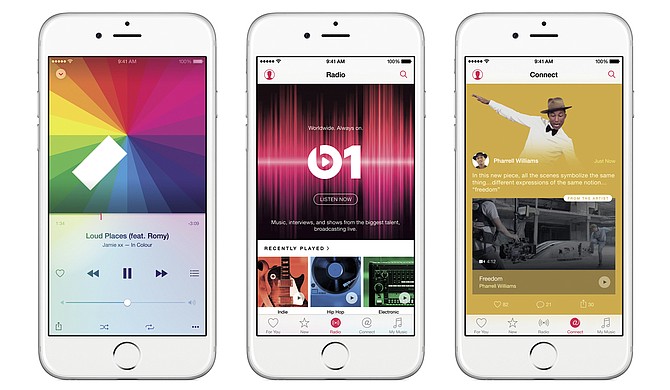Apple Music is the latest distributor to match consumers’ lowered value of music. Photo courtesy Apple Music
Another set ends, and thankfully, it ends well. While the next act sets up, my band mates and I make an assembly line to shove our gear off the stage quickly. Our drummer has to get home to his daughter, who is only a few months old and doesn't realize her dad is a rock star, so we help him break down and load his kit into the SUV.
Then, we disperse and pack our own equipment. For me, that means a guitar, a pedal board, an amp and the back-up bass amp, which we use more than the non-back-up since it's about half the size and a quarter of the weight. My wife, who usually doubles as our merch girl, helps me tear down the fold-out table and carry it outside, along with our box of T-shirts, which is undetectably lighter although we sold a few. As I close the trunk of my car with a loud metallic "clunk," I'm sweating and smiling.
That's the fun part. Here's where it gets worse. Once the night's entertainment has wrapped up and the crowd has mostly cleared out, I'm sitting at a bar. I eventually manage to flag down the bartender who, as is tradition, sends me to another bartender who tries to avoid eye contact for a while.
"What can I do for you?" she asks, as the bartender always asks.
"Just seeing who I need to talk to about payment," I say, again, as I always must.
She hesitates then disappears into a back room for a moment before returning with stack of cash. The stack dwindles: $150 for the venue's sound engineer and $40 for each of the bands, two of which have to travel a few hundred miles to play another venue in another city for roughly the same result. And that was actually one of the good nights.
It's the strangest dance, yet it happens constantly to any musician that isn't known well enough to warrant guaranteed pay. And far more often than not, we play knowing that we won't be paid at all.
German priest Martin Luther once said, "Next to the word of God, the noble art of music is the greatest treasure in the world." That quote gets way more intense. He goes on to say those who don't value music should only be allowed to hear "the braying of asses and the grunting of hogs."
The first part sticks with me, though. Music is a treasure. But the luster is wearing off, and we can't blame that all on venues. There's a reason that the hoops artists jump through are so widespread.
Look at the shift toward the music-streaming model and the latest contender for the throne: Apple Music. The service originally planned to stream songs with literally nothing going to the musicians that created them for its first three months, until Taylor Swift put her priceless foot down. So, why would Apple make such a huge misstep?
Why, for us, of course. Distributors have unfortunately heard the message loud and clear: We want music, but we aren't willing to pay much for it. It would be one thing if that only put a thorn in the big, faceless labels with armies of artists, but as is often the case, lowering our standards in one area is reflected in others.
A while back, a friend approached me excitedly to say he just downloaded all my band's music. Out of curiosity, I asked whether he used iTunes or Amazon. Neither, he said. He ripped it from our website with a program on his computer. Obviously, that didn't sit well with me.
"It's not a big deal," he shrugged. "People do it all the time."
I knew he was right. There are plenty of people who don't mind stealing music, even from musicians they know personally. There are people who sneak into shows by the droves so they can avoid a $7 cover. There are people who hear a song they love but balk at a dollar price tag.
But there are also those who are patrons of art. They don't mind dropping money on an album or a T-shirt or a show because they understand that every little bit contributes to making the next album or performance happen. Instilling value in music again isn't as difficult as it might seem. You just have to remember why it's valuable.


